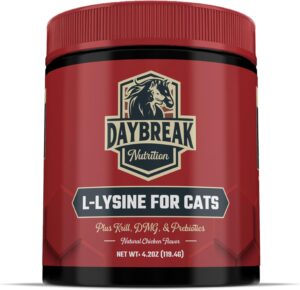Is your beloved feline friend suffering from persistent sneezing and watery eyes? As a pet healthcare professional, I understand how concerning these symptoms can be for pet parents. The good news? There’s a natural solution that’s been transforming the lives of cats across the country: L-Lysine supplements.
Understanding Your Cat’s Symptoms: More Than Just a Simple Cold
When your cat starts sneezing and developing watery eyes, it’s easy to dismiss it as a minor issue. But here’s what every cat owner needs to know: these symptoms often signal an underlying condition that requires attention. Left untreated, what seems like a simple cold could develop into a chronic problem affecting your cat’s quality of life.
Common Causes of Sneezing and Watery Eyes in Cats
- Feline Herpesvirus (FHV-1): The primary culprit behind most upper respiratory infections
- Bacterial Infections: Often secondary to viral infections
- Environmental Irritants: Dust, pollen, and household cleaners
- Allergies: Both seasonal and food-related
- Upper Respiratory Infections (URI): Common in multi-cat households and shelters
The Hidden Threat: Feline Herpesvirus
Did you know that up to 90% of cats have been exposed to feline herpesvirus? This common virus often lies dormant in your cat’s system, waiting for moments of stress or weakened immunity to resurface. When it does, the symptoms can be distressing:
- Frequent sneezing episodes
- Excessive eye watering
- Nasal discharge
- Conjunctivitis
- Lethargy and decreased appetite

The L-Lysine Solution: Nature’s Answer to Feline Respiratory Health
Here’s where L-Lysine comes in – and why Daybreak Nutrition’s premium supplement is making waves in the veterinary community. L-Lysine isn’t just another supplement; it’s a scientifically-backed amino acid that directly targets the underlying causes of your cat’s respiratory symptoms.

How L-Lysine Works
L-Lysine functions as a natural antiviral agent by:
- Blocking the replication of the herpesvirus
- Supporting immune system function
- Reducing the severity and frequency of symptoms
- Preventing future flare-ups
Why Choose Daybreak Nutrition’s L-Lysine?
Not all L-Lysine supplements are created equal. Daybreak Nutrition stands out for several crucial reasons:
- Pharmaceutical-Grade Quality: Maximum purity and potency
- Easy Administration: Specially formulated for feline consumption
- Optimal Dosage: Scientifically calculated for best results
- No Artificial Additives: Pure, clean formula your cat needs
Real Results from Real Cat Parents
“My Persian cat suffered from chronic eye problems for years. Two weeks on Daybreak Nutrition’s L-Lysine, and the improvement was remarkable!” – Sarah M., verified customer
The Science Behind the Success
Research has shown that L-Lysine supplementation can reduce viral shedding and symptom severity in cats with FHV-1. In a clinical study, cats receiving L-Lysine showed:
- 50% reduction in eye discharge
- Significant decrease in sneezing episodes
- Improved overall respiratory health
- Enhanced immune system response
When to Start L-Lysine Treatment
The earlier you begin L-Lysine supplementation, the better the results. Watch for these early warning signs:
- Occasional sneezing
- Mild eye discharge
- Squinting or pawing at eyes
- Reduced energy levels
- Changes in eating habits

Prevention: The Key to Long-Term Health
While L-Lysine effectively treats active symptoms, it’s also an excellent preventive measure. Regular supplementation can:
- Strengthen your cat’s immune system
- Reduce the likelihood of virus reactivation
- Minimize the severity of future episodes
- Support overall respiratory health
Remember: While L-Lysine is a powerful natural supplement, always consult with your veterinarian before starting any new treatment regimen, especially if your cat has existing health conditions or is taking other medications.
Disclaimer: This article is for informational purposes only and is not intended to replace professional veterinary advice. Always consult your veterinarian for proper diagnosis and treatment of your pet’s specific condition.